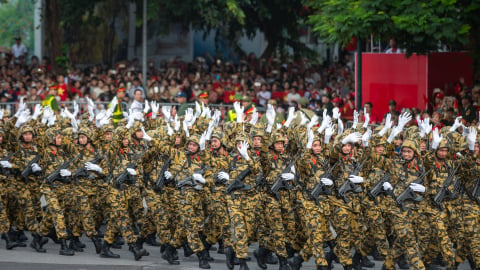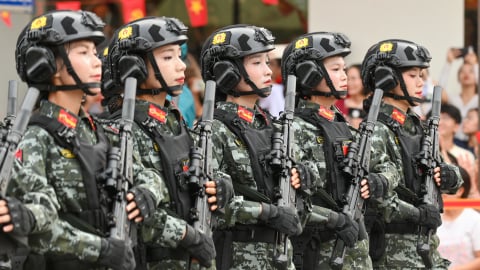_result.jpg_1.jpg)
Locate the "coordinates" of the fishermen.
The task of locating the fishermen before setting off was quite elaborate. We searched online and only found out that they were in the Yangshuo area. Beyond that, we had no further information. With only this limited information, we began our journey.
On our first day arriving in Guilin, it was gloomy and rainy. The temperature in mid-November had dropped to 5-6 degrees Celsius at night, accompanied by strong winds. We stayed at a riverside guesthouse, waiting for the next morning to catch a bus to Yangshuo. Communicating in China without knowing Mandarin was a major challenge and required skill. We prepared accordingly."Google Translate app"(A translation app) offline version on your phone. Just write whatever you want, and the app will automatically translate it into Chinese. That makes finding your way around much easier.
_result.jpg_7.jpg)
The places in China are very far apart; it takes about 3 pm to get there, starting from early morning. It's like another whole day of travel. Upon reaching Yangshuo, I could see the Li River in the distance. Walking along the pebble-strewn riverbank, lined with long rows of wild bamboo, the river was as beautiful as a traditional ink painting. We were excited, thinking to ourselves, "We're about to meet those old fishermen!" But we walked and walked all afternoon and still didn't see any. All we saw were old men renting out cormorants for souvenir photos.
Back at the hotel, I immediately asked the young owner. He replied, "They're not here. You have to go to Yangdi or Xingping." So the next morning we had to get up early and take a bus to Yangdi first, because on the map, Yangdi was located between Yangshuo and Xingping. The group decided to rent a tourist boat that afternoon to take us along the riverbank, hoping to spot the fishermen somewhere.
_result.jpg_2.jpg)
The boat sailed on and on without encountering anyone. Finally, we decided to disembark at a dock crowded with Chinese tourists taking photos. I showed a photographer a picture of the old man on my phone, instinctively thinking that photographers would know his contact information. Indeed, he said he could get in touch with the old man, but we'd have to pay him. We readily agreed, even though the fee was a bit high, as we had no other choice.
A chance encounter with Uncle Huang
An hour later, I heard the rumbling of a motorboat in the distance, and an old man with a long, white beard gradually appeared. He docked and stepped down; it was indeed the old man I had seen in the newspaper. I was overjoyed, because three days' journey, which seemed pointless, had finally led to meeting the old man I had always dreamed of. He brought with him an album containing all the photos of him taken by various photographers in magazines for me to see. What a famous old man!
_result.jpg_6.jpg)
Uncle Huang is 69 years old this year, and he fishes on the river every day. He lives with his wife in a small fishing village, just the two of them. Their children are grown and live separately. He is small in stature, wearing a red cloth shirt embroidered with dragons and phoenixes. Over it, he wears a straw raincoat. On his head, he wears a wide-brimmed hat woven from thin bamboo strips. Standing on the boat in the twilight, he resembles the wandering heroes in Jin Yong's martial arts novels.
He started working so I could take pictures. The two cormorants looked a little bigger than my Muscovy duck, with fiercer and stronger faces. He tied a small string around their necks and lowered them into the water. The hungry cormorants dived into the cold water to catch fish, but the string around their necks prevented them from swallowing, so they had to carry the fish back to the old man in their beaks. They worked like two skilled laborers. "After work," they were given a few small fish to eat.
_result.jpg_0.jpg)
A meal at Uncle Huang's house.
We said goodbye to Mr. Huang after the photoshoot and arranged to visit his house the next day. He gave me a business card with his picture, phone number, and address in Chinese. He spoke at length, but I didn't understand anything, so I just nodded and promised to try to come the next morning with the business card in hand.
Uncle Huang's house was easy to find; after crossing a small ferry and asking a few people for directions, we arrived. It was a fishing village in Xingping, where the river was very shallow in early winter. Uncle Huang's house was in a small alley, with three rooms. His wife invited us to a simple meal of pork stew with beans and a glass of hot rice wine. After eating, we went to the bamboo grove behind the garden to sleep until the afternoon, then said goodbye to Uncle Huang's family and the Li River to continue our exploration of China.
_result.jpg_3.jpg)
-------------------------------------------------
Additional information
+Trip:There are many ways to get to Guilin.
- By air: If flying with Xiamen Airlines from Ho Chi Minh City, you will have a layover at Xiamen Airport, then fly to Guilin Airport. If flying with China Southern Airlines from Ho Chi Minh City, you will have two layovers in Bangkok (Thailand) and Nanning (China) before flying to Guilin Airport.
- By road: FromGia L station(Hanoi), you go toafire emperorin Nanning. Giuh tcolorruna9:30 PMang ngay, price vé750,000 VND/personi.In particular, ifuYou follow himoom 6 ngperson or tìm was someoneI'm buying together.oom thìprice véwarehouseapproximately 530,000 VND/personi.From Nanning, take a Xiamen Airlines or China Southern Airlines flight to Guilin.
-To meet the old fishermen, after arriving in Guilin, you need to take a bus to Yangshuo, then continue by bus to Xingping. The journey takes about 1.5 days.
_result.jpg_4.jpg)
+ Visa:You can apply yourself at the Chinese Embassy (in Hanoi) or the Chinese Consulate (in Ho Chi Minh City). Or, if you don't want to waste time, you can use visa application services, which are very simple.
+ Language:It's advisable to learn basic conversational words and numbers beforehand to facilitate buying, selling, and trading with Chinese people. For more advanced communication, you can use instant translation apps on your smartphone like Google Translate (which can be used offline and doesn't require 3G).
+ Currency:It's advisable to exchange Chinese Yuan in Vietnam beforehand to get a better exchange rate. Exchanging in China is somewhat difficult and time-consuming, and the exchange rate isn't much better than in Vietnam.
+ Cuisine:Chinese food tends to be quite oily, so you should bring your own dry food if you don't like the local cuisine.
+Service:Guilin in particular, and China in general, are very good at tourism. Services are generally centrally managed by the government in a clear, transparent, and efficient manner. China always has a large number of domestic tourists regardless of the time of year. This is a huge resource for the development of their tourism industry, not to mention the influx of foreign tourists.
+ Book project: The "Legend of the Li River" journey is featured in travel books."Dusty Roads of Youth"By author Tam Bui, scheduled for release nationwide on September 17, 2017. Published by Kim Dong Publishing House. This travelogue combines imaginative writing with extremely vivid and realistic images of Tam Bui's journey through treacherous mountain passes in the Himalayas, across the most beautiful river in China (the Li River), exploring major Chinese cities such as Beijing, Shanghai, Xi'an… or venturing to the sacred land of Tibet. The book will be available at bookstores nationwide or can be purchased online via the website:www.tiki.vn
_result.jpg_5.jpg)
Text and photos: Tam Bui

 VI
VI EN
EN



_result.jpg.jpg)





























